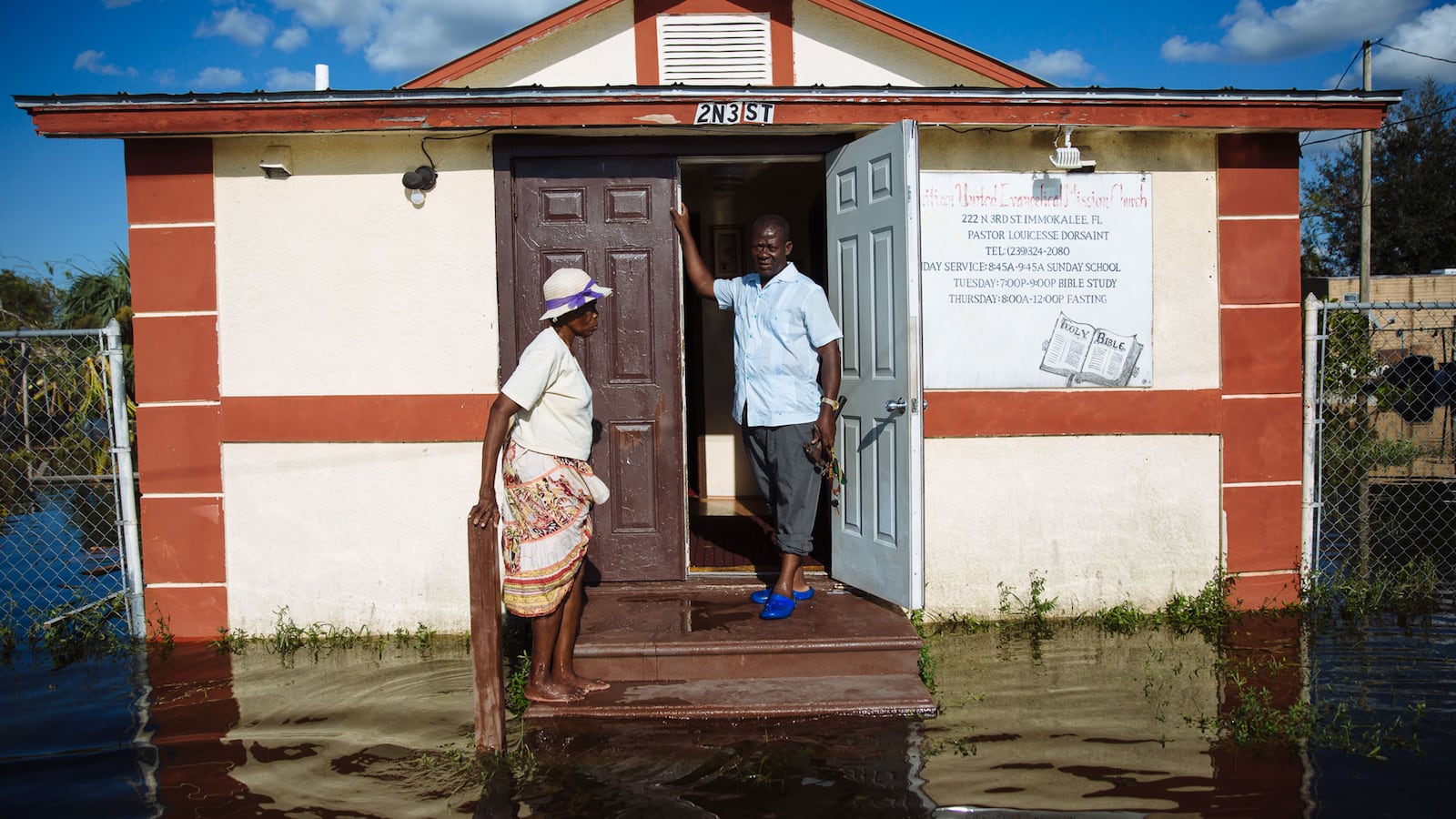IMMOKALEE, Florida — The response to Hurricane Irma’s devastation in Florida is a tale of two cities.
In Naples on the Gulf coast, there is a clear presence of police. Nearly every major intersection had police directing traffic. Gas stations were patrolled by cops when they reopened on Tuesday morning with hundreds of cars lined up, desperate to fill tanks. When one man tried to cut the line, it almost became violent before police came.
Fifty miles away in Immokalee, the only visible response by authorities are the hot pink “CONDEMNED” stickers they’ve slapped on wrecked homes. The city offered shelter and a local high school but there were no police at intersections, or charities like the Red Cross. As the sun went down the lack of power and cell service brought the town into what felt like complete isolation.
Entire neighborhoods were flooded by stagnant water, with piles of paneling strewn across roads and yards, trees draped over the tops of trailers crushing their roofs, and tarps acting as makeshift roofs.
“There is no food, no light, no gas, nothing,” said Pastor Louicesse Dorsaint of Haitian United Evangelical Mission.
Louicesse’s church, a small, white building trimmed in orange near the center of town, was surrounded by knee-high water. Inside it was completely dark due to plywood sheltering the windows from wind and debris. The heat was stifling and it smelled of mildew.

September 12, 2017 - Immokalee, United States: Hurricane Irma. A damaged home in Immokalee, Florida.
Daniel McKnight“Tonight we should have a Bible study and we cannot have it because I cannot carry the people across the water,” Louicesse said.
The majority of Immokalee’s residents are Haitian and Latino, whose lives depend on agricultural work on the farms in the surrounding area.

September 12, 2017 - Immokalee, United States: Hurricane Irma. Outside Sandra Guzman's trailer which was destroyed by Hurricane Irma in Immokalee, Florida. Pictured: Maria Valentine Romero, 6.
Daniel McKnight“And think about those people who don’t speak English, who go to the field to get some money to survive,” Louicesse said. “So now they can’t go anywhere, they can’t communicate.”
Many of Immokalee’s residents are undocumented. They said they feared ICE agents may be lying in wait at the school. Only after assurances that they would not be detained did families arrive.

September 12, 2017 - Immokalee, United States: Hurricane Irma. Louicesse Dormaint, Pastor of Haitian United Evangelical Mission in Immokalee outside his church.
Daniel McKnightOne Guatemalan family walked home from the shelter after the storm only to see their street filled with water, slowly warming from the hot sun. Wilson Perez waded through the water, carrying his 4-year-old son on his back to their home. They’re one of the lucky ones; their mobile home’s foundation was elevated.

September 12, 2017 - Immokalee, United States: Hurricane Irma. Damage to the home of Renel Madere and Eliane Dimanche in Immokalee, Florida.
Daniel McKnightOthers returned to find their homes condemned, like Eliane Dimanche. Her mobile home was partly crushed and knocked off of its foundation. Inside there were broken mirrors scattered along the floor, chairs on top of couches, and bedroom doors completely ripped open as though a large projectile rocketed through them.
Dimanche said through a translator that the county had condemned the trailer and told them they couldn’t go inside.

September 12, 2017 - Immokalee, United States: Hurricane Irma. Local residents return home to survey the damage in Immokalee, Florida.
Daniel McKnight“They only closed it and we have nowhere to go and no help and have not come by with any food or water,” she said.

September 12, 2017 - Immokalee, United States: Hurricane Irma. Louicesse Dormaint, Pastor of Haitian United Evangelical Mission in Immokalee outside his church.
All Photos By Daniel McKnightThe sky was visible through wooden beams of Sandra Guzman’s kitchen that days before supported a roof. When asked if she had insurance, the answer was a quiet no. That’s why her husband woke up Tuesday morning and returned to work. Her daughter Maria, age 6, skipped across the grass in wellies patterned with characters from Disney’s Frozen. The Guzmans plan to remain in their home, sleeping on cots under a roof fashioned from tarps.

September 12, 2017 - Immokalee, United States: Hurricane Irma. Flooding in Immokalee, Florida.
Daniel McKnightOne woman positioned three cinder blocks to support a stove over hot coals so she could cook what was left in her house because no one is bringing food. As one man who came to check on his mother said, “It’ll be a long time before they come.”






